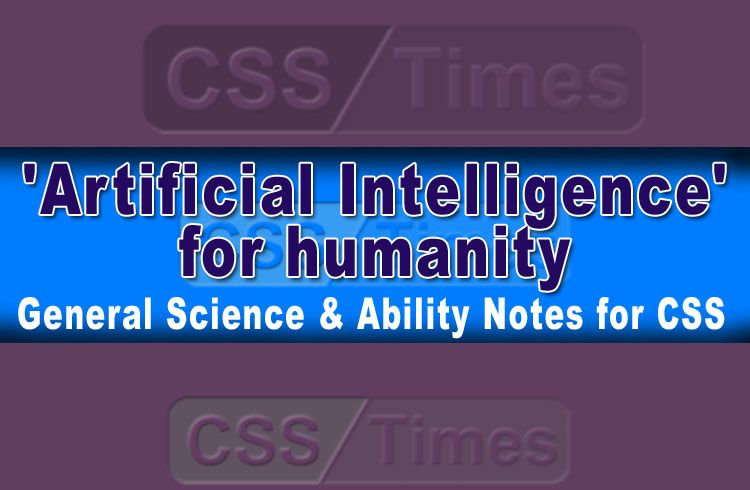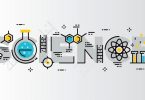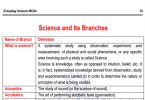Q: What is ‘Artificial Intelligence’?
How is it helpful for humanity? (CSS-2018)
Artificial Intelligence is a way of making a computer, a computer-controlled robot, or a software think intelligently, in the similar manner the intelligent humans think.
AI is accomplished by studying how human brain thinks, and how humans learn, decide, and work while trying to solve a problem, and then using the outcomes of this study as a basis of developing intelligent software and systems.
‘Artificial Intelligence’ for humanity
Artificial intelligence helps farmers, doctors and rescue workers make a positive impact on society.
Artificial intelligence (AI) powers many gadgets, like smartphones, smart thermostats and voice-activated virtual assistants that bring modern conveniences to daily life. Increasingly, AI is also being used to tackle critical social challenges.
AI is a branch of computer science where machines can sense, learn, reason, act and adapt to the real world, amplifying human capabilities and automating tedious or dangerous tasks.
Artificial Intelligence is already able, as many of us have seen for ourselves, to drive vehicles and negotiate obstacles. This is being used in modern civilian life, and has applications for military operations and space exploration.
Serious success is being seen in the trials of new machinery designed to identify tumours on CT scans and X-rays, and they have performed with at least 50 per cent more accuracy than human experts have so far.
Mining and managing Big Data, as well as discovering important correlations within it, is possible with e-discovery software. This technology is also being used to get through huge mountains of legal documents more effectively and efficiently than human paralegals can. Some journalism jobs like sports summaries and market reports are also already within the scope of AI, as are certain middle management tasks.
As AI continues to develop, it is not only able to take on tasks that can be broken down into smaller, easily learnable steps. There is growing concern that AI may become properly sentient and super-intelligent, displacing humans and rendering them obsolete. Elon Musk, Bill Gates and Stephen Hawking have all opined that this reality is not so far off. The debate on AI’s risks and benefits has strong voices on both sides.
Reframing Farming
One of AI’s greatest impacts could be in food production — an industry challenged by a rapidly growing world population, competition for natural resources and plateauing agricultural productivity. The Food and Agriculture Organization of the United Nations (FAO) estimates that the earth’s population will balloon to 9.7 billion people on by 2050. At a time when the agricultural land available for farming is shrinking, farmers will need to grow approximately 50 percent more crops.
Check Also: General Science MCQs
Improving Cancer Diagnosis
Cancer is a frightening diagnosis, impacting 1.65 million people in the U.S. in 2015. Waiting for biopsy results can be stressful, but AI may help accelerate the diagnosis and treatment process. Working with healthcare industry leaders, by 2020 Intel aims to create one-day precision medicine for cancer patients — that means going to the doctor, getting a diagnosis and receiving a personalized treatment plan, all in 24 hours.
Keeping Kids Safe
Digital technology makes it easier for predators to create, access and share child sexual abuse images worldwide. While fear of the negative consequences remain, AI is proving it can bring about enormous societal benefits.
Check also: Science Myths Exposed: Unraveling the Truth Behind Them
Our response to Artificial Intelligence
The response that human society formulates now to Artificial Intelligence is very important. The technology is a tool that could enhance our lives in many ways, but we need to continue to discuss its possibilities for subjective experiences and human emotions, its job displacement potential and other important issues, and to manage them responsibly.
The United States National Science and Technology’s Subcommittee on Machine Learning and Artificial Intelligence delivered a report to the White House on AI and employment in 2016, acknowledging job loss but also emphasising potential new careers and opportunities. Economists, anthropologists and other experts are also teaming up with AI scientists to explore its impact more, such as at a conference to discuss “beneficial AI” held in California in January 2017. Such active awareness and engagement with the issues will remain essential as we move into the future.
Check Other NOTES for General Science & Ability
- Science Myths Exposed: Unraveling the Truth Behind Them
- Science and its Branches
- Black Hole: What’s expected inside it? (CSS Paper 2007, 2018 Solution)
- Discuss the Function of Kidneys in Human Body (CSS Paper 2015 Solution)
- How solar eclipse and lunar eclipse are caused? (CSS Paper 2015 Solution)
- Different Branches of Science | General Science Notes
- Artificial Intelligence (AI) | CSS General Science & Ability Notes
- ‘Artificial Intelligence’ for humanity | General Science & Ability Notes
- What are Landslide and What Causes | General Science & Ability Notes
- Weather and Climate | General Science and Ability Notes







